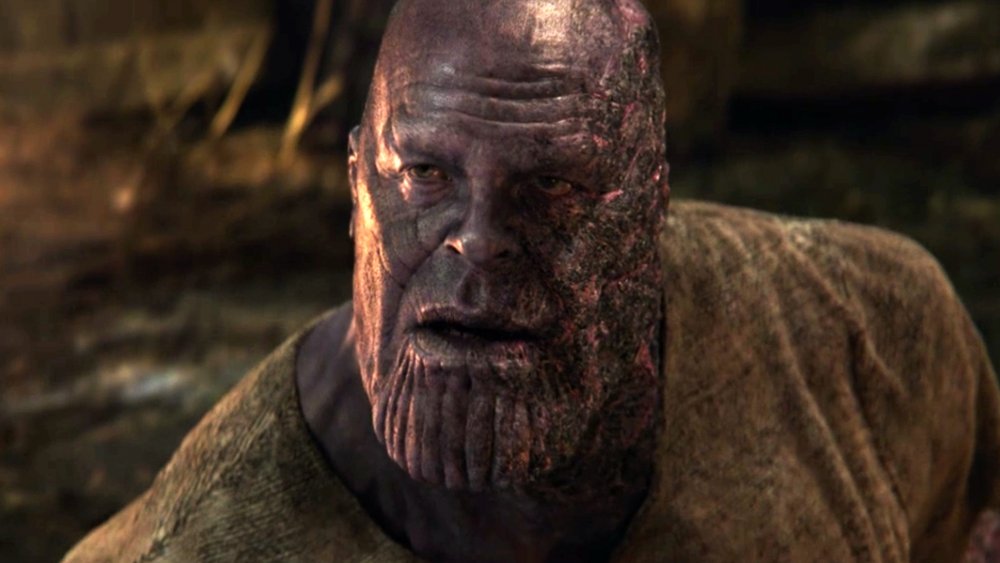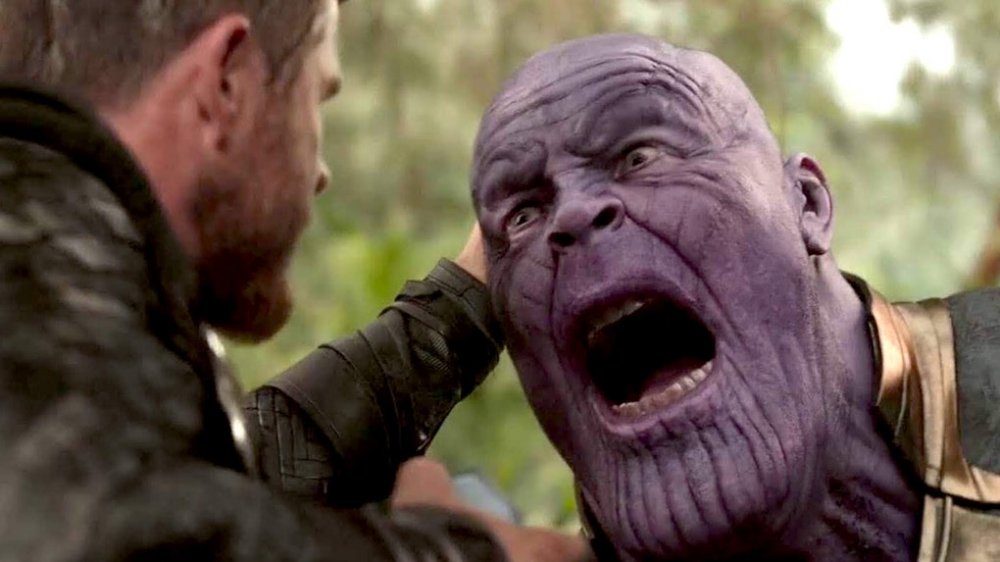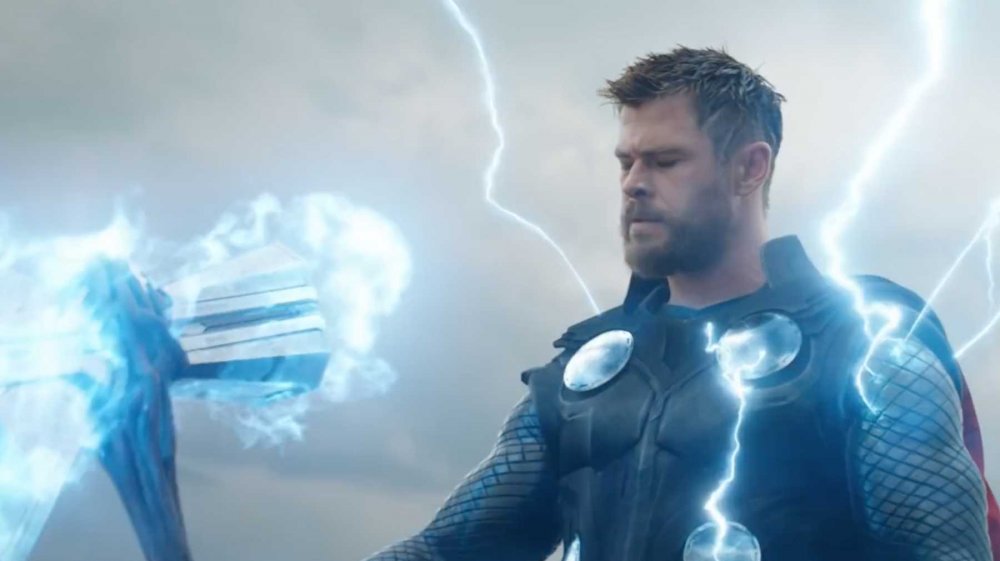The Truth Behind Avengers: Endgame's Beheading Scene
After Captain Marvel (Brie Larson) rescues Tony Stark (Robert Downey Jr.) and Nebula (Karen Gillan) from imminent death in deep space, bringing them back to safety at Avengers HQ, Avengers: Endgame sees a handful of heroes taking off in a fury to hunt Thanos (Josh Brolin) down for retribution. It's all swelling violin and emboldened trombone for two whole minutes before it ends with Thor (Chris Hemsworth) abruptly decapitating Thanos in a moment of pure rage. We linger just long enough to grab a couple allies' horrified reactions before a brutal cut to black. The whole scene was downright antithetical to what most of the audience anticipated when they walked into their Endgame screenings that night in April 2019 — both thematically and in terms of what anyone would expect to see in a Disney-owned and distributed film.
The editing staff was well aware of this fact, and Avengers: Endgame co-editor Jeff Ford recently spoke with Collider to talk about crafting this particular scene. He tacitly admitted that even for the Marvel Cinematic Universe, the decapitation was outside the usual standard of violence, and that a lot of thought went into the sequence.
"Most of us on the crew are parents and have young kids, and I think that's part of who we are. We think about that, but more importantly, it's about the scale of the story," said Ford. "So for instance, is it necessary? And is it narratively significant? And is it warranted? If you can answer those questions and you feel you need something that could be shocking or violent, then what's the most artful way to handle that so that you don't alienate the audience?"
The scale of Avengers: Endgame can't get much bigger, even for the MCU, and with that should come expressions of the heroes' extreme circumstances, problems, and emotions. For Thor, those emotions just happened to push him to cut Thanos' head off. Thanos' death also underlines a stark truth: it could have been that easy, and despite the heroes' recognition of the massive stakes and equally-massive effort made in Avengers: Infinity War to kill him prior to the snap, they failed miserably.
The beheading in Endgame wasn't about random violence — it was about Thor
Ford later described the thematic necessity of the brutality as part of Thor's character arc for Avengers: Endgame, explaining that "part of the story is Thor dealing with something he really shouldn't maybe have done."
When Thor loses his temper, it's usually a mistake, and that's been in several plot points of all the movies in which he's featured. His actions in Endgame were the culmination of everything he's done and been up until that point: a kind, righteous, and impulsive first son overburdened by everyone else's (and his own) expectations, brought to the doorstep of ultimate failure. Slaughtering Thanos in such an act of overkill was a compounding of failure, because even though there was no taking back the universe-halving action of Thanos' Infinity Gauntlet, empty murder isn't a hero's best method of coping, either.
It's because Thor chose to do what he did to Thanos in Avengers: Endgame, on top of failing literally half the universe in the previous movie, that the God of Thunder completely falls apart in the following five years. "You should have gone for the head" was Thanos' taunt in Infinity War — and when Thor is asked why he just chopped off Thanos' head mid-sentence, he responds, "I went for the head." Thor allowed himself to be defined by the mistake he made in Infinity War, and by Thanos, to the very last moment. That would destroy anybody's morale and sense of self once the moment caught up with them.
Making reality stick
Finality is an elusive concept to capture in a franchise like the MCU. The audience knows more is coming, and that the suspended reality of the superhero universe permits pretty much anything on the spectrum of possibility. Death is difficult enough to give weight in the Marvel movie world, but consequences are even more nebulous and slippery. Avengers: Endgame is a movie about failure first and foremost — it fixes the universe's state of being, but it doesn't fix the people existing within it. Thanos' decapitation scene demonstrated this, and served as a way to deliver a hard-hitting consequence within what Ford described to Collider as a "science fiction fantasy context."
He further explained, "There's an unreality to these movies [...] So there's a level of that that is slightly abstracted from what is real. And so you still want them to have sort of a visceral impact, you want the characters to feel it, but at the same time, people are doing things that people sometimes cannot do."
There's a big emotional difference between an overwhelming and hyper-fantastic all-character war — like the climactic final battle in Avengers: Endgame – and Thor's, well, intimate murder of Thanos. It tells a more complicated and nuanced story than any fight scene can. Still, Ford noted that the Endgame team didn't "want to be ghoulish," which is why you only see Thor's swing and a bit of blood on Nebula's face — implicit gore as opposed to something akin to a slasher film. The end result was a scene that delivered the time-to-get-extremely-real-ism the film needed and didn't alienate an audience that might balk at graphic violence.
In all, the point of the Thanos decapitation scene in Avengers: Endgame was to get right up in viewers' faces and say, "This is over, and it cannot be fixed like you thought it could be. You — and, most importantly, they — have to live with it."


